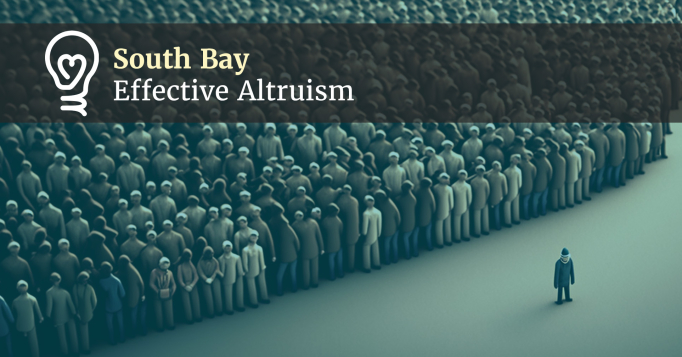Join us for an evening of guided discussion. Together, in small groups of 4-6, we will learn about and discuss population ethics, or the “study of the ethical problems arising when our actions affect who is born and how many people are born in the future.”
No background knowledge is needed, just an interest in learning. We’ll provide relevant context, definitions, and suggested discussion questions.
If you’re interested in joining, please RSVP so I can plan for enough drinks & snacks.
Date: Thursday, April 6
Time: 7:00 – 9:30 pm
- 7:00pm - Arrive, mingle
- 7:20pm - Announcements, then break into groups for guided discussions
- 9:00pm - Return to whole group
- 9:30pm - Closing remarks. Everyone can continue hanging out
Address: 1048 Polk Ave, Sunnyvale, CA 94086
- 27 minute (1.3) mile walk from the Sunnyvale Caltrain station
- Street parking is available
Covid protocol: This is an indoor, unmasked event. We ask all attendees to be vaccinated or have a negative test within the past two days.


Shame I missed it. I would have liked to bring up the point that while "Lucy" the oldest fossilized hominid was discovered to be around 3.2m-years–old, only barely 130,000 years ago the amount of homo-sapiens left standing after that ice age is estimated to have been roughly 600 - yes that's six-hundred individuals of whom we are all descended from, leaving us so genetically bankrupt and endangered that at the time our species had "less genetic diversity than a single troupe of West Africa chimpanzees." [https://www.cbc.ca/greathumanodyssey/content/iceage/135k/index.html?platform=hootsuite],
with a huge loss of genetic evolutionary data to the species we regressed into inbreeding for far too many generations than should have us at-all comfortable with the foolishness that the "fear of overpopulation",
propagated by the same wealthiest business owners of the World Economic Forum who benefited most out of everyone from industrial waste through planned obsolescence of product and the stonewalling of all efficient and green technology which doesn't generate constant customer return and dependence on their companies.
Hearing the members of the World Economic Forum like Bill Gates and Klaus Schwab talk about their concerns for "overpopulation" is like hearing a crack-addict mother who only has $20 to survive the weekend go and tell her children that she needs to sell them off to human trafficking because she can't afford their "eating habits."
We have enough empty homes to provide every homeless person in the world with 8 and that number of empty homes is only growing, not due to disease - but suicide - which likely is due to a certain ideology advertised - the belief that there's "too much people in the world"...
...which is a concern that tends to occur historically stemming from the very same tier of society which of course inevitably projects their denied emotions of shame and guilt over their ridiculously inhumane practices of structural violence every time the witnessing of their irresponsibility becomes tipped to being more undeniable to their guilt than their waking consciousness can quarry excuse of in order to deny.
Hi Villafana. Sorry I missed this comment earlier! Hope to see you at one of our other upcoming discussion groups if you're local :)
The goal of this discussion wasn't necessarily to determine if population growth is or isn't an issue (though lately I've seen more concern about declining replacement rates than overpopulation), but to better understanding why people in the EA community have considered population ethics and the different population-related tradeoffs that we might come across.
You mention housing for homeless people -- that's a great example of a situation that would be helpful to consider from different viewpoints within population ethics. How does it affect the wellbeing of communities who receive this new population? Is it ethical to incentivize people to move into housing or is it undermining individual choice? Is this the best way to increase wellbeing for homeless people who might have different values and desires? (no need to answer these questions, its just an example of how one might try to develop a deeper understanding)
Personally I haven't seen any data that shows an increase in available housing due to suicide deaths. I often fall back to Our World in Data, which shows the magnitude of deaths attributed to disease. These issues, such as mental and physical health, are often incredibly complex.